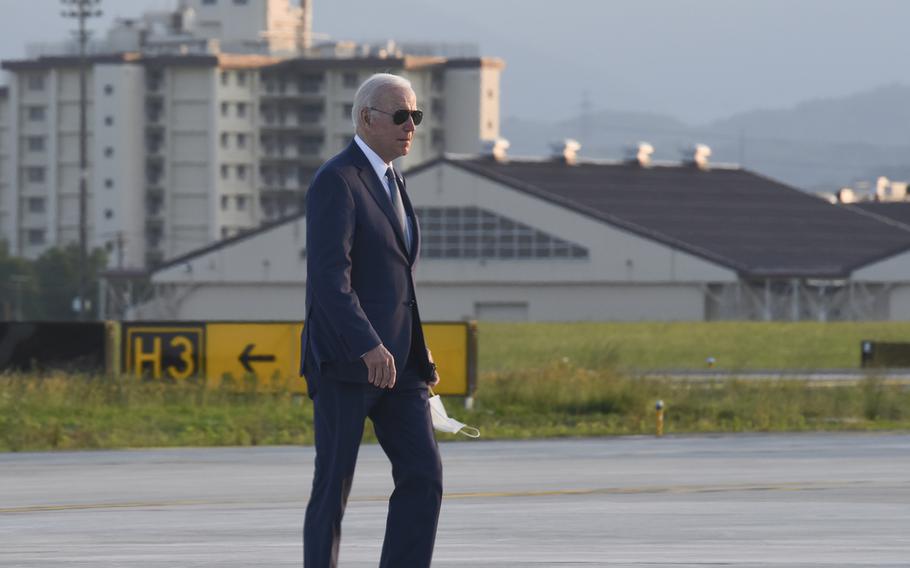
President Joe Biden walks toward Air Force One ahead of his departure from Yokota Air Base, Japan, Tuesday, May 24, 2022. (Kelly Agee/Stars and Stripes)
YOKOTA AIR BASE, Japan — President Joe Biden lifted off Tuesday in Air Force One from this airlift hub in western Tokyo, completing a five-day trip to Asia, his first as president, after strengthening ties with U.S. partners in the Indo-Pacific region.
Biden collected promises to improve a collective defense in South Korea and reinstate large military exercises there suspended in 2017, announced the formation of a 13-member Indo-Pacific Economic Framework in Japan and met with the leaders of Japan, India and Australia in a show of solidarity.
But his pledge to militarily defend Taiwan in the event of a Chinese invasion drew the most attention from worldwide media and international security experts.
Some analysts suggested Biden’s remarks reframed America’s policy of strategic ambiguity toward Taiwan’s relationship with China. Others said his remarks constituted only a repeat of the same pledge he’s made earlier.
“My policy has not changed at all,” Biden told reporters in Tokyo on Tuesday. “I stated that when I made my statement yesterday.”
Biden’s statement the previous day that, “yes,” the United States would defend the island democracy, was “an intentional gaffe,” according to Jeff Kingston, head of Asian studies at Temple University’s Tokyo campus.
The comment was quickly walked back by the White House but left “a strong impression of U.S. engagement,” he told Stars and Stripes in an email Monday.
Biden’s trip began Friday at Osan Air Base, South Korea, and ended Tuesday at Yokota Air Base, Tokyo, following the Quad summit, an informal strategic forum with Indian Prime Minister Narendra Modi, Japanese Prime Minister Fumio Kishida and newly elected Australian Prime Minister Anthony Albanese.
The four discussed their responses to the conflict in Ukraine and assessed its implications for the Indo-Pacific.
“Quad Leaders reiterated our strong resolve to maintain the peace and stability in the region,” read a joint statement issued after the summit.
The statement didn’t mention Russia, the aggressor in Ukraine. Moscow has been condemned and sanctioned by the U.S. and its allies but retains strong trade and defense ties to India.
The leaders also stated their support for freedom of navigation and overflight in the East and South China Seas.
China has occupied numerous islets and reefs in South China Sea in territory that is claimed by its neighbors. China also claims ownership of the Japan-administered Senkaku Islands in the East China Sea, and frequently sends vessels to the area.
“We strongly oppose any coercive, provocative or unilateral actions that seek to change the status quo and increase tensions in the area, such as the militarization of disputed features, the dangerous use of coast guard vessels and maritime militia, and efforts to disrupt other countries’ offshore resource exploitation activities individually and collectively,” the Quad leaders’ statement said.
They announced plans to extend more than $50 billion of infrastructure assistance and investment in the Indo-Pacific over the next five years. For a decade China has been financing roads, railways, ports, pipelines and power plants across Asia as part of its “Belt and Road” initiative.
The Quad leaders also vowed to cooperate on cyber security and space and to improve monitoring of the oceans and vessels traveling across them, something that will help regional partners respond to natural disasters and combat illegal fishing, according to the joint statement.